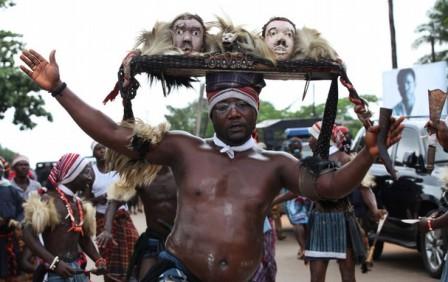There is a strong tendency today to assume that cultural outlooks of African origin are theistic, absolutely godly without elements of doubt or disbelief in God or gods. This is evident in the books and publications on African religion and cultures, in the anthropological works of Africans and non Africans alike. African societies are portrayed as incurably religious and superstitious. The cultures are represented as patches of primitive cave minded mysticism without some currents of anthropomorphism, agnosticism or skepticism. These representations inform the position of those who think that atheism and skepticism are notions and outlooks that are alien to Africa and to Africans. They are behind this much-referenced notion that rationalism and humanism are ‘western ideals’, and Africans who identify with these canons of thought are epistemologically selling out or are trying to play white or western.
Some scholars have authoritatively argued that mysticism or occultism typifies Africa’s translation of modernity, that expressions of magic are Africans’ way of appropriating modern goods.
Meanwhile there are some currents of atheism and agnosticism in many traditions and cultures in Africa. This is the case among the Igbo. The Igbo like other peoples in Nigeria are ‘very religious’. But their religiousity does not preclude some skepticism about god’s existence, about divine intervention in human affairs. Like in all cultures of the world the strands of religion, irreligion and areligion mix. The currents of atheism and agnosticism are present.
The god conception is anthropomorphic. The elements of anthropomorphism may not be as developed as they are in Europe and America. they do not capture an era in history as such but they lurk in local debates and discourses.
Atheism and anthropomorphism are present in the culture and demonstrate the intellectual quest of the people, their ideological struggles over the ages as they try to make sense of the world.
These elements are often captured in proverbs and wise sayings. As proverbs, these narratives are culturally resourceful. They are accessible to all, both believers and non believers alike. These sayings are used in communicating thoughtful messages. They are like kola nut which the Igbo use in chewing words, apologies to Achebe.
One of those Igbo sayings is Alusi kpakaria ike agwa ya osisi e jiri pia ya. This roughly translates ”If a ‘god’ starts terrorizing a community so much, you tell the ‘god’ the tree from which it was made”.
This is a saying used in checking the powers of any tyrant or dictator. It is a maxim used in cautioning against the abuse of power and political excesses. A tyrant is often believed to be acting like a god.
Representations of gods in Igbo traditional religion are often as wooden objects. Gods are carved images. The carved images look like human beings. The male god is carved to look like a man with a beard. And the female is made in the image of a woman with breasts!
These divine wooden crafts are placed at the shrine. People go there to pray, make requests and pledges, perform sacrifice and pour libations. The belief is that the gods are very powerful, at least powerful enough to protect the community that owns them. But when a god gets too powerful and starts terrorizing a community by harming them or their estate, then the god is made to understand its mundane and material origin. The god is made to know that it was created by human beings. The god will be shown the tree from which it is made. The god is made to understand that it cannot bite the hand that carved-created it.
Centuries of christian missioning have succeeded in changing the public nomination of Igbo gods. Most Igbos profess christianity, sometimes mixed with indigenous beliefs. They now regard their traditional gods as alusi which literally means an idol, a fake or false god. Still this has not changed the cultural significance, the anthropomorphic capital of gods in Igbo culture.
Elements of atheism or agnosticism in Igbo culture are evident in the response that is often elicited from people when someone saysMa Chi Kwe that means ”If the gods agree or approve”. Sometimes when the Igbo commit themselves to doing something. They end by saying Ma Chi Kwe-like saying Insha Allah or by the grace of God. Others who are not satisfied with the response would quickly reply ‘Onye Kwe Chi ya ekwe’. That means if you agree or resolve to doing something, your god will agree or approve it. It is not a case of resigning to god’s will as common in Abrahamic religions. It is not a case of fasting and praying for the will of God to be done as Christians do. But a case of ‘If you will then your god wills accordingly’. God is just the supporter not the decider or author of what is willed. Your will, not God’s, is the ultimate determinant. The will of the individual takes precedent over that of the god.
There are other sayings and responses that point to religious anthropomorphism and cultural humanism in Igbo culture. And these elements can be found not only in Igbo culture but also in other cultures across Africa.

